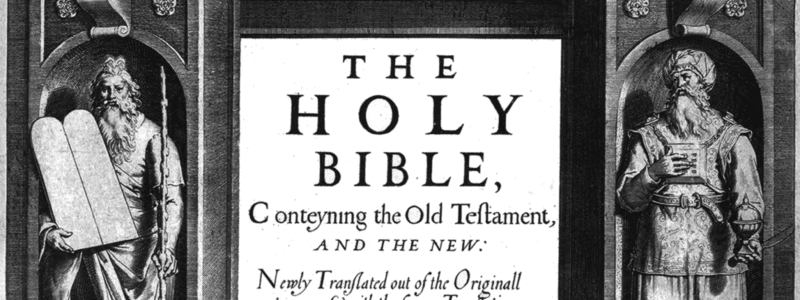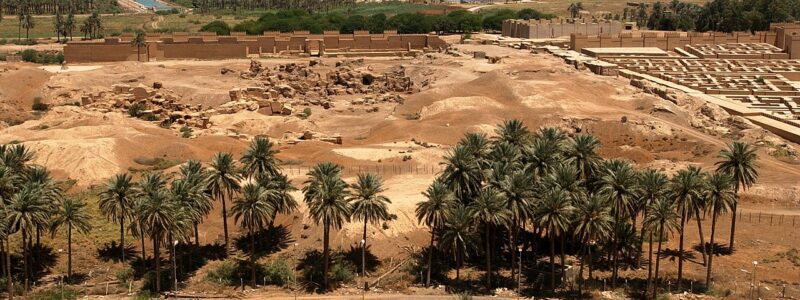Apostle John and First New Testament
The Apostle John is the only apostle who is thought to have escaped martyrdom and provided a link to the first New Testament. He was the apostle that “Jesus loved,” who was likely the youngest apostle and lived the longest – probably until about 100 AD. He was the son of Zebedee and Salome and James’s brother (who was probably killed by beheading by Herod Agrippa 1 early in church history in 44 AD). Some traditions hold that Salome was the sister of Jesus’ mother, Mary. That would make Salome Jesus’ aunt, and the sons of Zebedee would be Jesus’ first cousins.
John did not escape persecution, however. Tradition holds that he was exiled to the remote island of Patmos during the persecution cycle of the Roman Emperor Domitian. According to Andela Collins, a biblical scholar at Yale Divinity School notes,
Early tradition says that John was banished to Patmos by the Roman authorities. This tradition is credible because banishment was a common punishment used during the Imperial period for a number of offenses. Among such offenses were the practices of magic and astrology. Prophecy was viewed by the Romans as belonging to the same category, whether Pagan, Jewish, or Christian. Prophecy with political implications, like that expressed by John in the book of Revelation, would have been perceived as a threat to Roman political power and order.
Ignatius
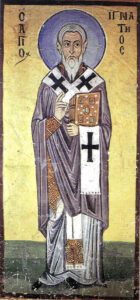
Ignatius of Antioch
Ignatius was one of the students of the apostle John. Ignatius (35 – 117) also called himself Theophorus, meaning “God Bearer.” He eventually became a bishop at Antioch (now in present-day Turkey) after the apostle Peter. He is considered one of the three most important Apostolic Fathers, with Clement of Rome and Polycarp. His work addresses matters such as the sacraments, the role of bishops, and ecclesiology.
Scholars argue that Ignatius was transferred to Rome at the request of the emperor to provide entertainment to the masses. He was transported from Antioch to Rome in chains guarded by ten Roman soldiers.
Ignatius was allowed to meet with Christian congregations while in chains on his trip to Rome. Numerous Christian visitors were permitted one-on-one meetings. He eventually met his martyrdom in Rome, where tradition holds he was eaten by “beasts,” possibly in the Colleseum.
Ignatius wrote several letters to the early church, including the seven which are extant today. Some of these letters have been corrupted over the centuries with the addition of additional passages, but we have copies of earlier genuine versions. In these letters, it was not Ignatius’ object to lay out the gospel – he presumed his audience had this basic knowledge. However, he did frequently refer to the New Testament documents and the nature of Christ.
These letters are important because they establish the New Testament concepts and documents that existed early in history.
Wallace notes several of the important church doctrines that are affirmed in Ignatius’ letters in his book Cold-Case Christianity,
The prophets predicted and waited for Christ
Jesus was in the line of King David
He is the “Son of God”
He was conceived by the Holy Spirit
A star announced his birth
He was born of the virgin Mary
He was baptized by John the Baptist
He was the “perfect” man
He manifested the will and knowledge of God the Father
He taught and had a “ministry” on earth
He was the source of wisdom and taught many commandments
He spoke the words of God
Ointment was poured on Jesus’ head
He was unjustly treated and condemned by men
He suffered and was crucified
He died on the cross
Jesus sacrificed Himself for us as an offering to God the Father
This all took place under the government of Pontius Pilate
Herod the Tetrarch was king
Jesus was resurrected
He had a physical resurrection body
He appeared to Peter and the others after the resurrection
He encouraged the disciples to touch Him after the resurrection
He ate with the disciples after the resurrection
The disciples were convinced by the resurrection appearances
The disciples were fearless after seeing the risen ChristJesus returned to God the Father
Jesus now lives in us
We liver forever as a result of our faith in Christ
He has the power to transform us
Jesus is the manifestation of God the Father
He is our only Master and the Son of God
He is the “Door,” the “Bread of Life,” and the “Eternal Word”
He is our High Priest
Jesus is “Lord”
Jesus is “God”
He is “our Savior” and the way to “true life.”
His sacrifice glorified us
Faith in Christ’s work on the cross saves us
This salvation and forgiveness are gifts of grace from God
Jesus loves the church
We (as the church) celebrate the Lord’s Supper in Jesus’s honor
Ignatius echoes John’s description of Christ and shows he was very familiar with New Testament Scripture.
Polycarp and his Link to New Testament
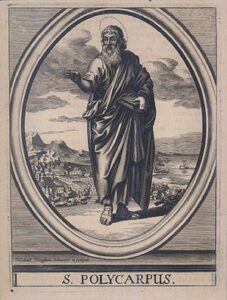
Polycarp
Polycarp was a friend of Ignatius and a student of John who was converted to Christianity by the apostles. He became the bishop of Smyrna (now in modern Turkey)
Polycarp wrote a letter to the Philippians and showed him to be familiar with John and several other apostles as well as their witness to the life of Christ. He also wrote about Paul, and his special relationship with the church at Philippi, confirming his work as an apostle. He referenced fourteen to sixteen of the books of the New Testament, establishing them as reliable.
Polycarp provided a witness to Christ in the following ways,
Jesus was sinless,
He taught commandments
He taught the Sermon on the Mount
He suffered and died on the cross,
He died for our sins,
His death on the cross saves us,
Our faith in Jesus’ work on the cross saves us
We are saved by grace,
Jesus was raised from the dead,
His resurrection ensures that we will be raised,
Jesus ascended to heaven and is seated at the right hand of God,
All things are subject to Christ,
He will judge the living and the dead,
Jesus is our “Savior”
Jesus is “Lord.
Polycarp’s writing affirms the early appearance of books from the New Testament as he and Ignatius quote from them. He believed them to be authoritative and an accurate history of actual events occurring during the first century.
Polycarp eventually sealed his testimony with martyrdom. He refused to burn incense to the Roman emperor. He was offered the opportunity to recant his belief in Christ but refused noting,
Eighty and six years I have served Him, and He has done me no wrong. How then can I blaspheme my King and Savior? You threaten me with a fire that burns for a season, and after a little while is quenched; but you are ignorant of the fire of everlasting punishment that is prepared for the wicked.
The Roman guards preparing Polycarp for his execution realized they had no rope to affix him to the post, and Polycarp assured them that no restraint was needed; he was burned alive and then pierced with a spear for good measure..
Irenaeus and his Link to New Testament
Iranaeus was born in Smyrna, a city in what is now called Turkey. It is the same city where Polycarp served as bishop.
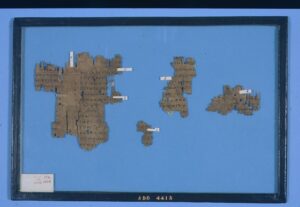
Irenaeus Writings from 200 AD
Iranaeus had the advantage of being born into a Christian family and actively listened to the teachings of Polycarp. He recalled Polycarp talking about his actual conversations with the apostle John.
Irenaeus eventually became the bishop of Lugdenum in Gaul (now Lyons in France). He developed into a mature theologian and fought against the heresies promulgated during his lifetime. He eventually published a very influential work called Against Heresies, which is available today. He is also credited with expanding Christian communities throughout present-day France.
Irenaeus defended orthodox Christianity against Gnosticism using as many as twenty-four New Testament books. He provides another link in the chain of custody of Biblical documents affirming the eyewitness accounts of the apostles writing the New Testament.
Irenaeus, a student of Polycarp who was a disciple of the apostle John, believed he was interpreting Scripture in the same manner as the apostles. This connection to Jesus through the apostle John was important to Irenaeus. He argued that his interpretation of Scripture was correct since he could trace his authority to Jesus, and the Gnostics could not.
Irenaeus also asserted that all four gospels – Matthew, Mark, Luke, and John were canonical scripture. Some theologians during his lifetime promoted one gospel and refuted the others. He is also the earliest attestation that the Gospel of John was written by John the Apostle and that Luke, the companion of Paul, wrote the Gospel of Luke.
He also cited the New Testament about 1,000 times, with approximately one-third of these citations being from the letters of Paul. He considered all 13 of these letters to have been written by Paul himself and to be authoritative.
Hippolytus and his Link to New Testament
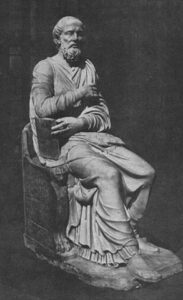
Hippolytus
Hippolytus was born in Rome and was a student of Irenaeus. He will be the next in line to proclaim the historicity of New Testament books.
He is known for opposing Roman bishops changing doctrine to fit the wishes of new converts from paganism. He was an excellent speaker of great learning who influenced other Christian leaders such as Origen of Alexandria.
Hippolytus wrote a ten-volume treatise called Refutation of All Heresies, which identified as many as twenty-four New Testament books as authoritative Scripture.
He was persecuted under Emperor Maximum Thrax and exiled to Sardinia, where he likely died working in the mines.
His writings, like those of his mentor Irenaeus, confirm the New Testament accounts.
Hippolytus lived until about 236 AD, just short of the first complete Bible in the Codes Sinaiticus written about 350 AD. Origen considered himself a pupil of Hippolytus, but we have no concrete evidence that this is the case.
Summary of John’s Link to the New Testament
The historicity of the New Testament books is established through the students of the Apostle John. These students became great theologians and quoted frequently from this New Testament Scripture. This helps to establish the New Testament Scriptures as being authoritative and historical. There is a chain of custody of these writings from John to nearly the date when the first complete New Testament was finally written – the Codex Sinaiticus.
The theologians stretching from John to the Codex all quote from these New Testament books providing a link between the Codex and the Apostle John.

